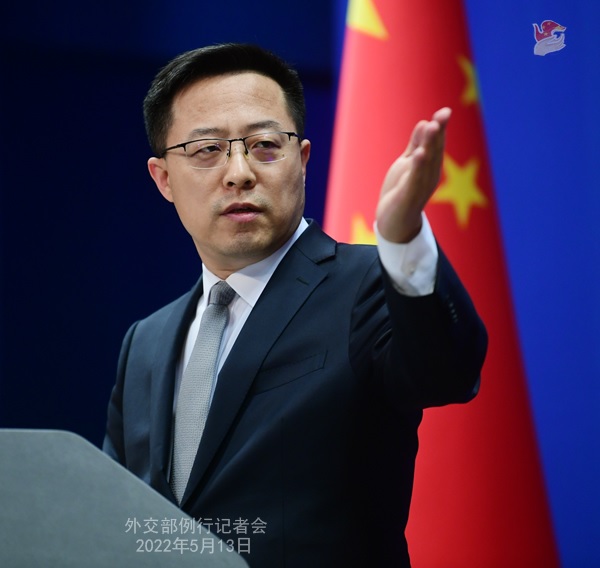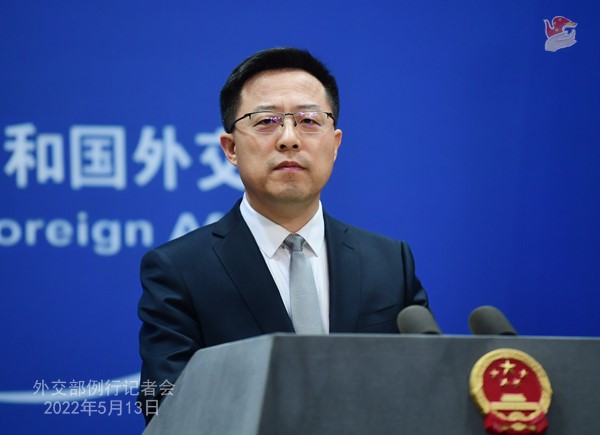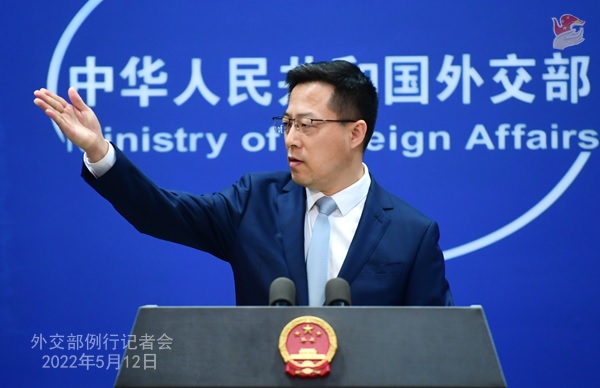China Foreign Ministry Presser, May 12 & 13

China’sForeign Ministry Spokesperson, Zhao Lijian, held his regular press briefing on May 12 and 13, and fielded a wide range of questions– Covid 19 pandemic, to North Korea, US-ASEAN summit to Uyghur issue, Hong Kong elections to Ukraine war, and Sri Lanka debt.
Given below are some excerpts. First from May 13, 2022
Phoenix TV: Two questions on the US. Do you think the cooperation initiatives put forward by the US is aimed at countering China’s cooperation with ASEAN? Second, according to the latest data released by the UN in May, the US owes more than $1 billion dues for the UN’s regular budget and over $1.4 billion peacekeeping assessment. Do you have any comment?
Zhao Lijian: ………You may ask the US side whether the relevant initiatives are aimed at countering China. On my part, I want to say that both China and the US are Asia-Pacific countries. There is no reason why we cannot share regional friends. It is important to heed the call of regional countries to maintain peace, deepen cooperation and seek common development, and uphold the principles of mutual respect and win-win cooperation. It is necessary that we bear in mind the common and long-term interests of the region, play a positive and constructive part in regional peace, stability and development and do more concrete things for regional?cooperation in?Asia-Pacific with a healthy mindset and constructive approach.
On your second question, the US owing dues to the UN and other international organizations is nothing new. I noted that some media call the US a “deadbeat” country?at?the?UN.?
Whether the US, one of the UN’s founding members and the largest contributor, pays in full?and?on?time its assessed contributions matter to the normal operation of the UN. The payment is also an important way for the US to serve its international obligations and practice multilateralism. However, since 1980s, the US has always owed the largest amount of dues to the UN. In recent years, it often owes up to one billion dollars, accounting for 60% or 70% of the total unpaid dues. In terms of peace keeping assessment, the US often owes the largest share of contributions for years. In 2019, it owed as much as $2.378 billion, accounting for 66% of the total unpaid assessment.? ……
The arrears the US accumulates to the UN regular budget and peacekeeping assessment doesn’t go away; it is mounting as days go by. The greater deficit in the US credibility, the longer the US would live with the label of “the biggest debtor nation” in the UN. The US should shoulder responsibilities, pay its assessments in full and on time, make up for the arrears, take the lead in fulfilling its financial obligations to the UN, and act upon its commitment to multilateralism.
Bloomberg: The US State Department has outlined plans to boost pressure on China over the latter’s policy on Uyghur and other ethnic minorities in Xinjiang. In a report to Congress, the department explained how the US would raise relevant concerns in meetings with other nations, multilateral institutions such as the G7, and the private sector. Does the foreign ministry have a comment on this?Bloomberg: The US State Department has outlined plans to boost pressure on China over the latter’s policy on Uyghur and other ethnic minorities in Xinjiang. In a report to Congress, the department explained how the US would raise relevant concerns in meetings with other nations, multilateral institutions such as the G7, and the private sector. Does the foreign ministry have a comment on this?
Zhao Lijian: As the Chinese side has repeatedly stressed, the allegation of “genocide” in Xinjiang is nothing but the lie of the century concocted by some people in the US in total disregard of facts. It has been debunked time and again when confronted with the truth. The US keeps spreading rumors and smearing China in an attempt to tarnish China’s image and contain its development, but such plots will not succeed.
The international community has a fair judgement as to who is truly guilty of genocide. The US also knows the answer very well itself. We hope the US will do some earnest soul-searching regarding the 500,000 child laborers working on American farms and all those Native American lives lost to genocide over the past decades. We also urge the US to stop meddling in China’s internal affairs and put an end to its sinister agenda of containing China by fabricating malicious lies.

AFP: I have two questions. First, can you offer more details as to why China voted against a probe into possible war crimes by Russian troops in Ukraine? This vote was taken at the UN Human Rights Council (HRC). The second question is, how does China react to the appointment of the new Prime Minister in Sri Lanka Ranil Wickremesinghe? And also, are there any updates on what kind of debt relief or debt restructuring that China may offer Sri Lanka?
Zhao Lijian: To answer your first question, Ambassador Chen Xu, Permanent Representative of China to the United Nations Office at Geneva, has elaborated on China’s position at the Human Rights Council. China maintains that the sovereignty and territorial integrity of all countries including Ukraine should be respected, that the purposes and principles of the UN Charter should be upheld, that the legitimate security concerns of all countries should be taken seriously, and that all efforts conducive to a peaceful resolution of the crisis should be supported. Putting an early end to the fight is the urgent expectation of the international community. It is also what China is striving for. The international community should create enabling conditions for Russia-Ukraine negotiations, and do more to facilitate a political settlement, rather than lay down obstacles or increase impediments, still less to add fuel to the fire and escalate tensions. As no country can base its security on the insecurity of other countries, we should stay committed to the vision of common, comprehensive, cooperative and sustainable security, and build together a balanced, effective and sustainable global and regional security architecture.
In recent years, politicization and confrontation at the Human Rights Council has been on the rise, so has “double standards” and selectivity. While the HRC frequently holds Special Sessions regarding certain countries, it fails to take effective actions regarding those countries that have long been slandering and making rumors about the human rights situations in others, that wilfully waged wars of aggression on others, killing civilians in overseas military operations, that abused unilateral coercive measures, and those where racism is rampant, gun violence goes incessant and where refugees and migrants are subject to abuse. This has severely undermined confidence in the objectivity and impartiality of the HRC, tarnished the HRC’s credibility and entailed division within the HRC. That is why China voted against the resolution. We call upon all parties to get back to the founding mission of the HRC, uphold true multilateralism, and work together to promote the sound development of the international human rights cause.
On your second question, China and Sri Lanka enjoy traditional friendship. We have been following closely the developments of the situation in Sri Lanka. We support the Sri Lankan government and relevant political parties’ latest efforts to stabilize the situation. It is our sincere hope that all sides in Sri Lanka will put the fundamental interests of the nation and the people first, stay united, safeguard stability, and tide over the current difficulties together.
As to your question concerning Sri Lanka’s debt issues, the Chinese side has made clear its position on several occasions. We will maintain communication and consultation with the Sri Lankan side, and help it restore political and economic stability at an early date.
Reuters: Just again on the UN vote there. You mentioned that China believes that in the past, the UN has looked into and targeted certain countries, but not others. Does that mean China objects to what the UN Human Rights Council has done in the past? But when it comes to this specific resolution, if we were just to ignore the previous issues that China has, does China have any issues at all with this current resolution?
Zhao Lijian: I just gave a very detailed explanation. What you said is your own interpretation. Politicization at the Human Rights Council has been on the rise, so has “double standards” and selectivity. China voted against the resolution based on its principled position on the Ukraine issue. We have made it clear on many occasions.
https://www.mfa.gov.cn/eng/xwfw_665399/s2510_665401/202205/t20220513_10685941.html
NOW EXCERPTS FROM THE MAY12 PRESSER

Associated Press of Pakistan: Yesterday State Councilor and Foreign Minister Wang Yi had a virtual meeting with Pakistani Foreign Minister Bilawal Bhutto Zardari. We noted that it is the first meeting between Chinese and Pakistani foreign ministers since the new Pakistani government came into power. Can you share more information?
Zhao Lijian: State Councilor and Foreign Minister Wang Yi had a virtual meeting with Pakistani Foreign Minister Bilawal Bhutto Zardari yesterday. It is not only the first meeting between Chinese and Pakistani foreign ministers since the new Pakistani government came into office, but also the first official bilateral activity of Foreign Minister Bilawal Zardari since?he?was inaugurated. The two foreign ministers reached important consensus on deepening the all-weather strategic cooperative partnership and practical cooperation between the two countries, and exchanged views on better protecting the security of Chinese citizens and institutions in Pakistan. The two foreign ministers shared the following.
First, the two countries should carry forward their traditional friendship. Developing amicable relations with China has always been a common perception in Pakistan that transcends all political differences and enjoys a high degree of agreement throughout Pakistan. Foreign Minister Bilawal Zardari said Pakistan-China friendship is a cornerstone of Pakistan’s foreign policy and a strategic priority. The new Pakistani government will promote Pakistan-China relations at “Pakistan speed”. State Councilor Wang Yi also stressed that the friendship between the two sides will be passed on from generation to generation and will not be shaken or changed by any single event. It is believed that, with joint efforts, China-Pakistan all-weather strategic cooperative partnership will be further developed and traditional friendship will be further carried forward.
Second, the two countries should deepen practical cooperation in various areas. China is ready to seek greater synergy between the two countries’ development strategies, support Pakistan in maintaining economic and financial stability, and build a high-quality China-Pakistan Economic Corridor (CPEC) together. The two sides should not only properly operate and develop existing important projects, but also further their cooperation in industrial and other sectors to boost the vitality and resilience of Pakistan’s economic development. The two countries should carry out more livelihood projects, so that CPEC can better benefit the people along the route and achieve the goal of high standard, sustainable and people-centered development.?
Lastly, the two countries should strengthen counter-terrorism and law enforcement and security cooperation. For some time, Pakistan has seen a series of terrorist attacks on Chinese nationals. The Chinese government and Chinese leaders attach great importance to this, and the Chinese society and people pay close attention to it. The Pakistani side has committed to make thorough investigation and bring all criminals to justice, enhance security protection of Chinese programs and personnel in Pakistan, and resolutely prevent any malicious provocation and sabotage targeting CPEC. Any forces’?attempt to undermine China-Pakistan relations will never succeed.
Beijing Daily: The US Interior Department released a report on May 11 that at least 500 American?Indians, Alaska Native and Native Hawaiian children died while in boarding schools operated or supported by the US government. What is your comment?
Zhao Lijian: I have noted the report you mentioned. It confirmed that Indigenous children of the US endured a tragic past of torture in Indian boarding schools. The report expects that continued investigation will reveal the approximate number of Indigenous children who died at Federal Indian boarding schools to be in the thousands or tens of thousands.
Such a report is long overdue. Prior to that, the US government had never kept official statistics on the real conditions of these schools, or verified the number of Indigenous children who went to the institutions, died there or were missing. In fact, the US was reluctant to admit the existence of the history at first, and even tried to cover it up. But the great pressure from the Indigenous communities, the whole country and the wider world eventually compelled the US to look into the past and unearth facts that shock the world. The report shows from 1819 to 1969, Indigenous children went through unfair treatment including whipping, sexual abuse, forced labor and severe malnourishment in more than 400 federal Indian boarding schools, and more than 500 children died as a result.
The US is founded on the atrocious massacre and persecution of the Indigenous population. The maltreatment of Indigenous?people is the US original sin convicted by the Indian boarding schools. American?Indians used to be the dominant population in North America, which has shrunk to represent only 2% of the current US population after massacre and eviction. The US achieved cultural assimilation and territorial?dispossession with forced separation and resettlement of Indigenous children. But the trauma generations have gone through persists even till today. American?Indians are still under discrimination with worrying health conditions and destitution. Among all the ethnic communities of the US, American?Indians have the lowest life expectancy, the highest poverty rate, the highest rate of youth alcohol abuse, and the lowest community doctor-to-patient ratio. In 2019, about 25% of American?Indians lived in poverty, which is 2.5 times that of the national average.?
The dark history of Indian boarding schools is only a tip of the iceberg of the US’ systemic racial discrimination and human rights problems. Racial minorities including Americans of Asian, African, Latin American descent and Muslims still cannot breathe or gain security. Statistics from US research institutions revealed that anti-Asian hate crimes surged by 339% in 2021. From the “Tulsa Massacre” to George Floyd, and to Patrick Lyoya of Michigan who died of police violence not long ago, the list of African American deaths only goes?on?and?on amid racial discrimination. People of Latin American descent, accounting for 19% of the US population, only possess 2% of the country’s wealth. Up to 93.7% of Muslims in the US are living in the shadows of Islamophobia.
The US should fulfill its commitment of “all men are created equal” with concrete actions, and adopt serious measures to truly help ethnic minorities get over their trauma. More importantly, the US should learn from history, treat the social endemic of racism, and avoid repeating the human?rights tragedies time and again.
Reuters: Reuters reported that?the Biden administration has drafted an executive order that would give the Department of Justice powers to stop foreign countries like China from accessing Americans’ personal data. Does the foreign ministry have any comment?
Zhao Lijian: I have noted relevant reports. On the issue of data security, China has been above board, open and cooperative. China’s laws clearly stipulate that data security, personal information and other legitimate rights and interests of all citizens and organizations should be protected. The Chinese government strictly abides by the principles of the protection of data security, and prohibits and cracks down on illegal activities in accordance with law. China has also put forward the Global Initiative on Data Security, which calls on all countries not to directly access overseas data via companies or individuals.?
All countries have the right to take?measures?to?protect the personal data and privacy of their citizens. But the relevant measures should be reasonable and well-grounded. They should not be reduced to tools to suppress certain countries and companies by overstretching national security concepts and abusing state power.
https://www.fmprc.gov.cn/mfa_eng/xwfw_665399/s2510_665401/2511_665403/202205/t20220512_10685185.html
-
Book Shelf
-
 Book Review
DESTINY OF A DYSFUNCTIONAL NUCLEAR STATE
Book Review
DESTINY OF A DYSFUNCTIONAL NUCLEAR STATE
- Book ReviewChina FO Presser Where is the fountainhead of jihad?
- Book ReviewNews Pak Syndrome bedevils Indo-Bangla ties
- Book Review Understanding Vedic Equality….: Book Review
- Book Review Buddhism Made Easy: Book Review
- Book ReviewNews Elegant Summary Of Krishnamurti’s teachings
- Book Review Review: Perspectives: The Timeless Way of Wisdom
- Book ReviewNews Rituals too a world of Rhythm
- Book Review Marx After Marxism
- Book Review John Updike’s Terrorist – a review
-
-
Recent Top Post
- NewsTop Story Record Pentagon spending bill and America’s hidden nuclear rearmament
-
 NewsTop Story
Taliban Suffers Devastating Blow With Killing Of Minister
NewsTop Story
Taliban Suffers Devastating Blow With Killing Of Minister
-
 China NewsCommentaries
Reality Shadow over Sino-American ties
China NewsCommentaries
Reality Shadow over Sino-American ties
-
 CommentariesNews
Ides of trade between India and Pakistan
CommentariesNews
Ides of trade between India and Pakistan
-
 CommentariesTop Story
Palestinians at the cross- roads
CommentariesTop Story
Palestinians at the cross- roads
-
 CommentariesTop Story
While Modi professes concern for the jobless, “his government’s budget escalates class war”
CommentariesTop Story
While Modi professes concern for the jobless, “his government’s budget escalates class war”
-
 CommentariesNews
Politics of Mayhem: Narrative Slipping from Modi ….?
CommentariesNews
Politics of Mayhem: Narrative Slipping from Modi ….?
-
 Commentaries
Impasse over BRI Projects in Nepal
Commentaries
Impasse over BRI Projects in Nepal
-
 CommentariesNews
Yet another Musical Chairs in Kathmandu
CommentariesNews
Yet another Musical Chairs in Kathmandu
-
 CommentariesTop Story
Spurt in Anti-India Activities in Canada
CommentariesTop Story
Spurt in Anti-India Activities in Canada
AdSense code



















